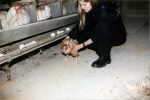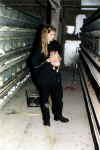

Last summer, a friend whom I had only known virtually through the internet, visited me for the first time. She is from the north of Germany, whereas I live in the south. While we were talking, she mentioned that she too would like to participate in direct animal liberation activities. Although being vegan for a long time, she had never had the opportunity to do so before because there were few other animal rights activists where she lived. Half-jokingly, I asked, "Why, how about tonight?", and she said, "Yes!"
Just a few days earlier, we had been contacted by someone who had offered to adopt some hens. They had heard that our animal rights group, Maqi, often spent more time in battery farms than their owners.
What a coincidence! Usually, it takes lots of planning: searching for places where the freed animals can spend the rest of their lives happily, without being threatened by a chopper; researching animal factories we can enter without being caught; finding a day when all people involved (liberators as well as "foster parents") don't have to go to work the next day; making phone calls and sending e-mails ...
After liberation, the animals have to be transported, sometimes hundreds of miles. For example, some of the geese we freed from a goose factory farm, last christmas, went to France near Colmar, and others were taken to Belgium. And now this person, who was going to adopt these animals, lived in the same town as me, only a few minutes away from a battery farm.
We spent the rest of the day talking and watching some videos of TV reports about some of our former AR activities, especially other chicken liberations.
Some time after midnight, we prepared transport boxes, checked the torches and went. After some twenty minutes, we reached the battery farm.
We were a little bit concerned because when we arrived we saw there was a light on in the downstairs office. But nobody was in there.
As usual, the doors were unlocked so we turned the handle. The sight of thousands and thousands of birds squeezed in narrow cages was terrible. It is one thing to see it on pictures or videos, but quite another thing to stand amidst them, to hear their cackling and crying (sometimes a chicken can whine like a human baby); to smell the poisonous ammonia from the sewage and to feel the irritation of the dust-loaded air in ones nose.
 |
 |
Sometimes, when the workers remove the cages either the bodies of dead hens (who did not survive the torture of laying one egg per day and standing on sloped
wire in a tiny prison) or the live hens who did survive, but who are now going to be
butchered and replaced by younger ones, one of the inmates
in the
same cage escapes. The workers don't care to take the time to catch
them. This means certain death for the birds for they can't get any
water, which is only available inside the cages. They die of thirst.
Last time we were in a battery farm, we found eight of them alive in the
corridors who would have died within days, or maybe hours, if we had not
have taken them with us.
(who did not survive the torture of laying one egg per day and standing on sloped
wire in a tiny prison) or the live hens who did survive, but who are now going to be
butchered and replaced by younger ones, one of the inmates
in the
same cage escapes. The workers don't care to take the time to catch
them. This means certain death for the birds for they can't get any
water, which is only available inside the cages. They die of thirst.
Last time we were in a battery farm, we found eight of them alive in the
corridors who would have died within days, or maybe hours, if we had not
have taken them with us.
Now this corpse looked horrible, not only decayed but lacerated.
 |  |
We caught her, took some others from the cages and left.
Usually it takes a vegan approximately one year of not eating eggs to save the live of one hen. This time, it had taken us two hours to save the lives of several chickens. Sometimes it's so easy.
first published in
Julie H. Rosenfield
"Vegan Stories", 2002